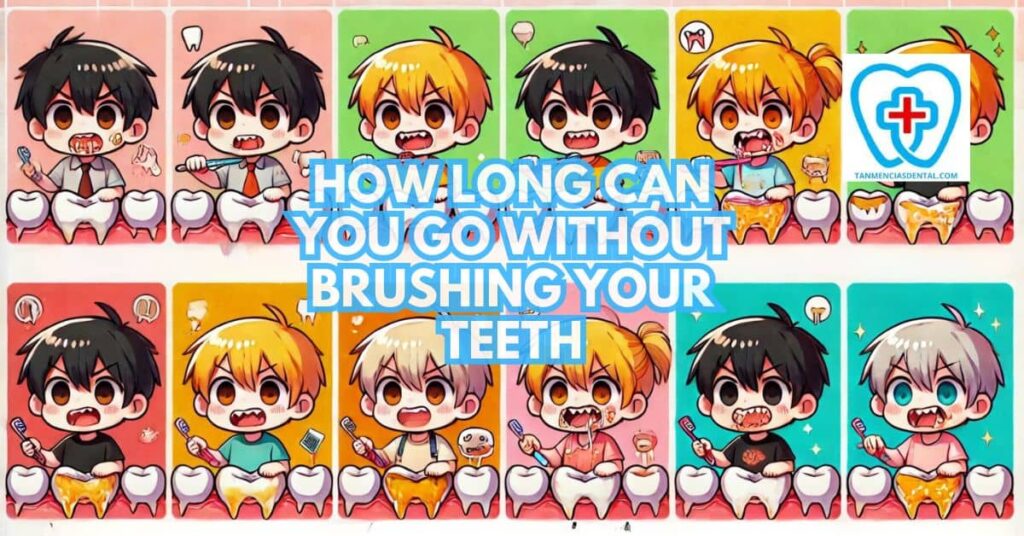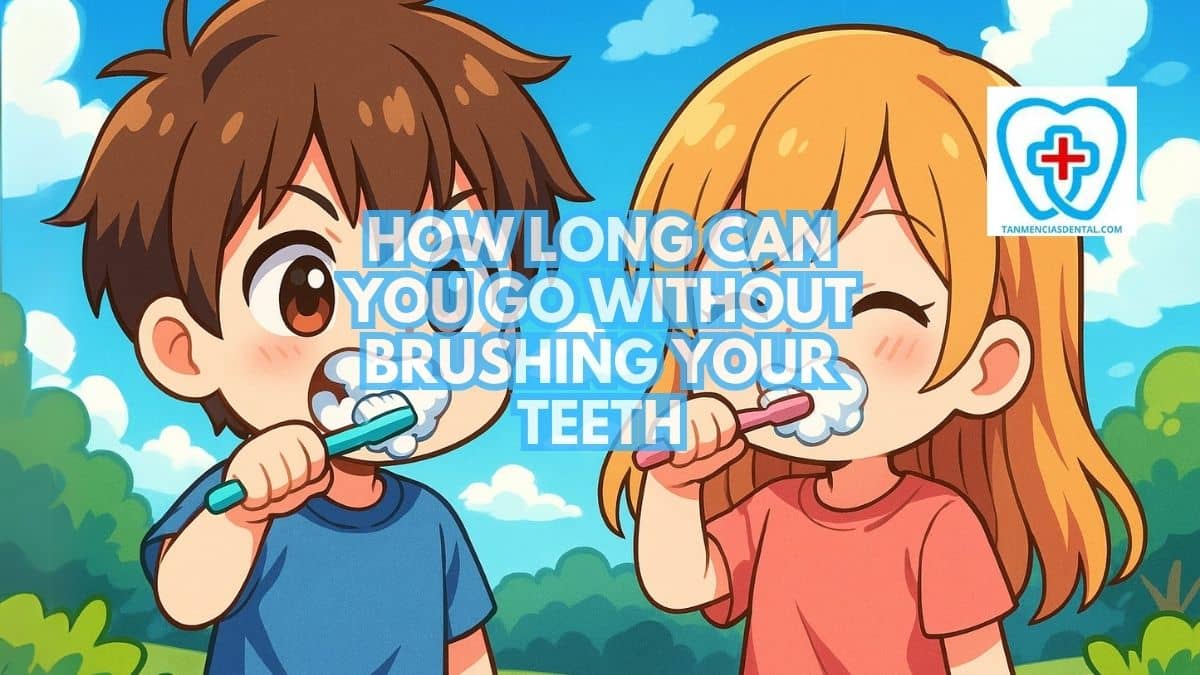Have you ever wondered how long you can go without brushing your teeth?
Even skipping one day can start causing problems in your mouth.
Bacteria build up quickly and lead to plaque, bad breath, and tooth decay.
Brushing your teeth every day is one of the easiest ways to keep your mouth healthy.
We’ll explain what happens over time when you stop brushing and why it matters for your teeth and your health.
1. Within a Day: Brushing Away the Risks of Plaque Buildup
Plaque starts to form on your teeth just hours after you stop brushing.
It is a soft, sticky layer made of bacteria, leftover food, and saliva.
If you don’t brush twice a day, this plaque can quickly cover your teeth and hide between your gums.
Plaque feeds on the sugars in your food and makes acids that can damage your teeth and gums.
If not removed, it hardens into tartar, which is much harder to clean and must be removed by a dentist.
Skipping even one day of brushing puts your dental health at risk and allows harmful bacteria to grow.
To protect your teeth and gums, it’s important to brush twice a day and keep a daily routine.
🦷 When Is It Safe to Brush Your Teeth After Wisdom Tooth Removal?
2. A Few Days In: When Plaque Becomes a Problem
After a few days without brushing, plaque hardens into tartar, which can only be removed by a dentist.
Tartar buildup can irritate your gums, leading to inflammation and bleeding.
The risk of cavities also increases as the hardened plaque harbors harmful bacteria.
Tartar makes your teeth feel rough and can cause bad breath.
It is crucial to brush regularly to prevent tartar formation and maintain oral health.
🦷 Ways to Brighten Your Smile While Wearing Braces
3. Week One and Beyond: Gingivitis: The Warning Sign
Going a week without brushing can lead to gingivitis, an early form of gum disease.
Symptoms include red, swollen gums that may bleed when you brush.
Gingivitis is caused by plaque irritating the gums, leading to inflammation.
This condition is reversible with proper oral hygiene, but it can progress if ignored.
Regular brushing and flossing are key to preventing and treating gingivitis.
🦷 Why Using an Interdental Brush with Braces Is Important for Clean Teeth
4. Stained Smiles and Hardened Trouble: Discoloration and Tartar Buildup
As you continue to skip brushing, your teeth may become stained.
Foods and drinks like coffee, tea, and wine contribute to this discoloration.
Tartar buildup increases, making your teeth feel rough and dirty.
The rough surface of tartar attracts more stains and bacteria.
Over time, your smile becomes less bright and your oral health deteriorates.
🦷 How to Gently Remove Food from Wisdom Tooth Sockets Without Hurting Healing

5. One Month In: Bad Breath and Oral Infections
After a month without brushing, you are likely to experience persistent bad breath.
The buildup of bacteria in your mouth can also lead to oral infections.
These infections can cause pain, swelling, and redness in your gums.
If left untreated, they can spread and cause more serious health issues.
Regular brushing is essential to keep your mouth clean and free from infections.
🦷 What to Do If Your Teeth Hurt When You Eat or Drink Something Cold
6. Months Down the Line: How Cavities Develop
Months of neglecting brushing lead to the development of cavities.
Cavities are permanent damage to the enamel caused by acids from bacteria.
These bacteria thrive on food particles and produce acids that erode the tooth enamel.
If left untreated, cavities can cause severe pain and tooth loss.
Maintaining healthy teeth and preventing cavities requires routine dental examinations and brushing.
🦷 How Full-Arch Dental Implants Can Bring Back Your Smile and Confidence
7. Why Skipping Brushing Is More Harmful for Children and Teens
Children and teens are more at risk for cavities because their tooth enamel is softer and not fully developed.
When they don’t brush their teeth regularly, bacteria build up and start to damage the teeth and gums.
Skipping even one day of brushing can lead to early signs of gum disease and tooth decay.
Kids and teens need to brush their teeth twice a day to stop plaque from forming.
If baby teeth are lost too soon because of decay, adult teeth may grow in the wrong position.
Learning to care for your teeth early helps create good habits that last into adulthood.
Along with brushing, it’s also important to visit your dentist for regular checkups to catch problems early.
🦷 Can Dental Implant Screws Fail? Causes and Tips to Avoid Problems
8. A Year Without Brushing: Advanced Gum Disease Sets In
A year without brushing can result in advanced gum disease, known as periodontitis.
This condition can cause gums to recede and teeth to become loose.
Periodontitis destroys the bones that support your teeth, leading to tooth loss.
The damage caused by periodontitis is often irreversible and requires intensive treatment.
Keeping up a consistent brushing schedule is essential to avoiding severe gum disease.
🦷 How to Manage Dental Care Costs in Marikina: Insurance and Payment Options
9. Years of Neglect: The Dangers of Severe Gum Disease
Years without proper brushing can result in severe gum disease, known as periodontitis.
This condition can destroy the bones that support your teeth, leading to tooth loss.
It often causes chronic bad breath and can make eating painful.
Severe gum disease can also result in abscesses, which are painful pockets of infection.
Periodontitis is a serious condition that requires professional treatment and long-term management.
🦷 How to Clean Your Teeth Without Using Toothpaste or a Toothbrush
10. Beyond the Mouth: The Link Between Oral Health and Overall Health
Poor oral hygiene is linked to serious health problems beyond the mouth.
Conditions like heart disease, diabetes, and respiratory issues are connected to gum disease.
Bacteria from the mouth can enter the bloodstream and affect other parts of the body.
Maintaining good oral hygiene is essential for overall health and well-being.
Brushing your teeth is a simple yet effective way to protect your whole body.
🦷 Can Brushing Too Often or Too Hard Damage Your Teeth?
11. Brushing and Flossing: The Pillars of Good Oral Hygiene
Brushing and flossing are the foundation of good oral hygiene.
These practices help remove food particles and bacteria from your mouth.
Brushing cleans the surfaces of your teeth, while flossing removes debris between teeth and along the gum line.
Consistent oral care prevents dental problems and promotes a healthy smile.
Make brushing and flossing a daily habit to ensure long-term oral health.
🦷 Expert Family Dentists in Marikina City
👨⚕️ Conclusion
Consistent brushing is essential for preventing dental and overall health issues.
Neglecting this simple routine can lead to significant problems over time.
From plaque buildup and cavities to severe gum disease and systemic health issues, the risks are substantial.
Commit to regular brushing to keep your mouth and body healthy.
A few minutes each day can make a big difference in maintaining your overall well-being.
😊 Self-Promotion
Visit Tan-Mencias Dental Clinic in Parang, Marikina City, for all your dental care needs!
Our friendly and professional team is here to ensure you leave with a bright, healthy smile.
Reach out to us with any questions or concerns by calling 9171451074, leaving a message on our Facebook page, or using our website’s contact form.
We’re dedicated to providing excellent care and making your dental experience pleasant.
Book your appointment today and experience the best in dental care!

